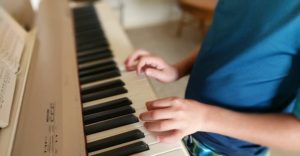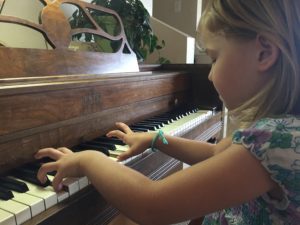Every single piano student, no matter who you are or where you are from will have one thing in common: practice. It is the absolute most essential ingredient to a piano player’s success. But practicing the wrong way will only bring you harm.
Here are seven ways you can improve your practice today, for the beginning student or the advanced student. I call them my Piano Practice MUST DO’s! Please refer to Dr. Brent Hugh, assistant professor of piano at Missouri Western State College Department of Music. I have taken his advice to heart and added in my own experience to the steps you find here.
7 Piano Practicing Tips:
- Listen to yourself.
- Do it right from the very first.
- Try to understand the music.
- Write it down.
- Be your own teacher.
- Identify, figure out, and fix!
- Ask: Does it sound right? Does it feel right? Does it look right?

Let me expound on those a little more so you get what I mean.
1. LISTEN to yourself!
Playing the piano is a brain activity more than anything else. And the more active your brain is engaged, the more successful you will be. This seems like a no-duh statement but believe me, we need to remember to truly listen to ourselves.
One way to do this is to record yourself and play it back. I can’t tell you how insightful this has been for me on many occasions! I can pick up on so many more nuances and keys to help me better my music when I can sit there and critique my music as I watch or listen to myself play the music.
2. Do it RIGHT from the very first.
In a fascinating study here, a group of researchers led by Robert Duke of The University of Texas at Austin learned just how important dealing with our mistakes can be. Seventeen piano and piano pedagogy majors were given three measures of a difficult passage. Under certain restrictions, they were allowed to practice the passage for as long as they wanted.
Each student practiced, some for as short as about 8 minutes, some for as long as 57 minutes. Twenty four hours later they were invited back to play the passage they had practiced the day earlier. The top performers were found to have some similar correlations. Interestingly, the amount of time the students had practiced the passage had no correlation with the correct playing of the passage on the day of the performance.
There were several habits that were found to be similar within the top performers, but the single most prevalent habit was that of how they dealt with their mistakes. Slowing the passages down, studying the passage thoroughly in order to seek to play it 100% correct from the very first, had the greatest impact on their success.
So take the time to slow down, study it out, and watch closely so that from the very first time you play it, it is as perfect as you can make it. The age old adage is true for piano: perfect practice makes perfect.
3. Try to UNDERSTAND the music.
Before you even begin putting your fingers to the keys, study your music closely.
- Have you heard this piece before? What do you remember about it? What kinds of feelings did it portray?
- Do you recognize the composer? What do you know about that composer, the time period in which it was written, and the typical style of that composer?
- What is the key of the song and what mood is that key going to portray? Are their key changes and where?
- What is the style of the music? Do you recognize the music form in which it was written?
- What is the time signature of the music and what should that time signature portray?
- What is the title of your piece? What does that tell you about how the piece should be played? How should it feel and what story will it tell your audience?
- Look for any difficult passages. Watch for patterns within the music.
- What is the tempo of the music supposed to be? What is the rhythm of the music and how should it flow?
Doing a thorough study of your music will certainly help you to play the piece as it has been intended. It will give your brain a heads up for those things which it should notice.
Familiarizing yourself with these things now, before you begin to worry about actually playing it, is a fantastic exercise for your brain. Your brain can log these things away and begin to create your music even before you even begin to play it.
I’m telling you, the power of your brain is unbelievable and we need to use it to your best advantage in your music. This is one of those smart ways in which to practice so that you can play smarter and not harder.
4. WRITE it down.
Again, we are using your brain to your best advantage here. Write down in your music, or on a notebook kept for this purpose, in your phone, or somewhere, anywhere! Actually writing something down will log it into your brain yet again.
Our brain needs repetition. Just mindlessly practicing a passage over and over again is not always the best repetition for it. Writing it down will allow for your brain to wrap around the concept in yet one more way.
Write down what you are thinking about the music, ways you can better improve your music, problem spots, your inspiration for how to play the song, your interpretations.
Write down what your teacher says! Why on earth would you spend all that time and energy, not to mention money on the teacher who is there to help you if you don’t remember a thing they say?! Not only will your lessons go twice as far, your teacher will be able to do that much more with you if you are taking to heart the things they are trying to tell you.
Listen to them, write it down, and refer back to it. Your teacher is there for a reason. Trust him/her. Do it.
5. Be your OWN teacher.
Seriously. Do we really need to say much more? You are a living, breathing human being and your brain has the same functionality as the next person. So do yourself a favor and teach yourself.
Critique yourself. Notice those things in which you know you can improve. Catch those weaknesses you know you have and actually do something about it before you have to be told.
I guarantee you are your own best teacher. If you find yourself stuck on something, try and find a solution for how to fix it. Use your written notes (refer to #4 write it down). Don’t give up. You could more often than not find what you are looking for to help you on the internet.
In the same regard, most teachers are also one of your best cheerleaders. Don’t give up on yourself and give yourself a pat on the back when you know you have done something difficult. Make sure you are your own best teacher. You sure can learn a lot from yourself.
6. Identify, figure out, and FIX!
This is usually one of the only practice techniques most teachers talk about. Of course, it is super important and don’t get me wrong, I totally believe in this step. I just completely know that the other steps are just as important as well!
So now I can get off my soap box and tell you how just how awesome this practice tip is. This is how we get down and dirty. It’s time to pull on your coveralls and really get to work.
As per #2, do it right from the very first, we hopefully don’t have a ton of problem spots. But there are always going to be a few. Take those problem spots and isolate them. Figure out exactly what is going wrong and how you can change that.
Retraining your fingers to unlearn their bad habits that you developed in the first place can be tricky, but you can do it. It can be fixed! Don’t get too frustrated.
Sometimes you give it your best shot and then give it a break and come back to it the next day. Sometimes your brain just needs a break and you can more easily fix it the next day.
7. Ask: Does it SOUND right? Does it FEEL right? Does it LOOK right?
Again, listen to yourself. We are trying to engage both sides of your brain here. Constantly be asking yourself these questions. Make it sound right, feel right, and look right, and you will soon be playing like the pros.
Conclusion
For real, these steps WORK! When I found this article from Dr. Brent Hugh, assistant professor of piano at Missouri Western State College Department of Music, it changed my life! And the lives of my students. Give it a go right now. Go change your piano practicing for forever! Here is a handout with these principles that you can use in case you want to print something out for your student’s to refer to: Piano Practice MUST DO’s.
Best Way to Learn Piano Online
I highly recommend you checking out Pianoforall. It has been used over and over (with over a quarter million students) by piano students since 2006 and it is the best course you can take online for its incredible value. The testimonials speak for itself — just go read a few of them, their are tons of amazing reviews as piano students go from knowing nothing, to playing within days. 60 days, money back guarantee, and even then, it has a return rate below 4%. It is extremely affordable with only a one time payment and free updates for life. You won’t find another program out there with that kind of value and that kind of positive feedback.
Related Articles:
How much time do pianists practice every day?
Piano Music Your Students Will Love
Tel loves her life as a piano player, a piano teacher, and a mom. Amid piano blogging, piano teaching, and piano playing, she loves a chance to fit in a good exercise class, volunteer at her kids’ school and at her church, and go on long dates with her husband. Full bio at About Tel.




These 7 steps to practicing the piano are great ideas! I can see ways to use those 7 steps in other areas of life as well.
Thank you! I am glad you enjoyed them!
This website is sure looking professional.
Wonderful article. I’m building a practice app for music students called iamtete.com. For point #7, do you think hearing feedback from a teacher or simply a pre-vetted musician will be helpful for student right after they’re done with practice?
I am sure any feedback would be helpful!